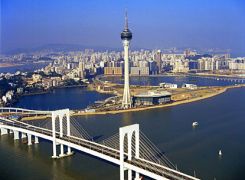
Macau (traditional Chinese: 澳門; simplified Chinese: 澳门; Jyutping: ou3 mun4), also known as Macao is one of the two special administrative regions of the People's Republic of China, the other being Hong Kong. Macau lies on the western side of the Pearl River Delta, bordering Guangdong province to the north and facing the South China Sea in the east and south.
The territory features industries such as textiles and toys, as well as a notable tourist and gambling sector. It has the highest life expectancy in the world(2008).
Macau was a Portuguese colony and both the first and last European colony in China. Portuguese traders first settled in Macau in the 16th century and subsequently administered the region until the handover on 20 December 1999. The Sino-Portuguese Joint Declaration and the Basic Law of Macau stipulate that Macau operates with a high degree of autonomy until at least 2049, fifty years after the transfer.
Under the policy of "one country, two systems", the Central People's Government is responsible for the territory's defence and foreign affairs, while Macau maintains its own legal system, police force, monetary system, customs policy, immigration policy, and delegates to international organisations and events.
The mixing of the Chinese and Portuguese cultures and religious traditions for more than four centuries has left Macau with an inimitable collection of holidays, festivals and events. The biggest event of the year is the Macau Grand Prix in November, when the main streets in Macau Peninsula are converted to a racetrack bearing similarities with the Monaco Grand Prix. Other annual events include Macau Arts festival in March, the International Fireworks Display Contest in September, the International Music festival in October and/or November, and the Macau International Marathon in December.
The Lunar Chinese New Year is the most important traditional festival and celebration normally takes place in late January or early February. The Pou Tai Un Temple in Taipa is the place for the Feast of Tou Tei, the Earth god, in February. The Procession of the Passion of Our Lord is a well-known Catholic rite and journey, which travels from Igreja de Santo Agostinho to Igreja da Sé Catedral, also taking place in February.
A-Ma Temple, which honours the Goddess Matsu, is in full swing in April with many congratulant worshippers during the A-Ma festival. In May it is common to see dancing dragons at the Feast of the Drunken Dragon and twinkling-clean Buddhas at the Feast of the Bathing of Lord Buddha. In Coloane Village, the Taoist god Tam Kong is also honoured on the same day. Dragon Boat festival is brought into play on Nam Van Lake in June and Hungry Ghosts' festival, in late August and/or early September every year. All events and festivities of the year end with Winter Solstice in December.
Local cooking in Macau consists of a blend of Cantonese and Portuguese cuisines. Many unique dishes resulted from the spice blends that the wives of Portuguese sailors used in an attempt to replicate European dishes. Its ingredients and seasonings include those from Europe, South America, Africa, India, and Southeast Asia, as well as local Chinese ingredients. Typically, Macanese food is seasoned with various spices and flavours including turmeric, coconut milk, cinnamon and bacalhau, giving special aromas and tastes. Famous dishes include Galinha à Portuguesa, Galinha à Africana (African chicken), Bacalhau, Macanese Chili Shrimps and stir-fry curry crab. Pork chop bun, ginger milk and Portuguese-style egg tart are also very popular in Macau.
Macau preserves many historical properties in the urban area. The Historic Centre of Macau, which includes some twenty-five historic monuments and public squares, was officially listed as a World Heritage Site by UNESCO on July 15, 2005 during the 29th session of the World Heritage Committee, held in Durban, South Africa.


No comments:
Post a Comment